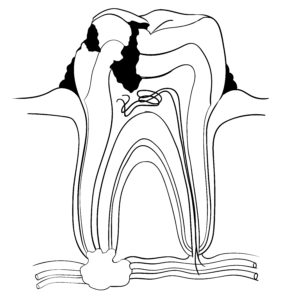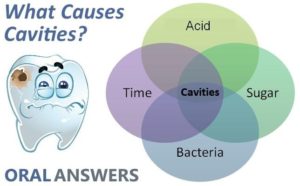What Makes Someone High Risk for Cavities?

High Risk for Cavities
An article in Newsweek magazine made headlines last week for debunking a theory that some people inherit their bad teeth (or high risk for cavities) from their parents. The study on identical and fraternal twins showed that there is no genetic component to the risk factors for tooth decay. Whether it is genetic or not, you should know your risk level for cavities in order to make changes to your diet and/or oral hygiene routine, and thus lower your risk.
What is a cavity?
A cavity is the destruction of tooth structure caused by a combination of bacteria, sugar and acid. When bacteria in the mouth digests sugar, acid is produced. The acid destroys enamel, just like it etches glass, and this process is called demineralization. Once a cavity has grown through the outer layer of enamel, it cannot be reversed.
What are the different types of cavities?
Cavities can form on any surface of the tooth, including the pits and fissures on the biting surface, smooth surfaces and any exposed root. Pit & fissure cavities are the type that can be prevented by placing dental sealants before a cavity has formed. Smooth surface cavities, most commonly in between the teeth, are discovered with bitewing x-rays, typically taken by your dentist once a year. Root cavities can be seen on visual examination, or on an x-ray if they are large.
How do cavities happen?
Four things are required for a cavity to form: 1) bacteria 2) sugar, 3) acid, and 4) time. The bacteria present in the mouth thrive on simple carbohydrates, the sugars in most crackers, cookies, candy, soda, sports drinks, and most juices. The more bacteria you have in your mouth, the more likely you are to get a cavity. This factor emphasizes the importance of daily home care and regular dental cleanings. The more sugar your teeth are exposed to, the more likely you are to get a cavity. This factor emphasizes the importance of your diet. The longer your teeth are exposed to sugar or acid, the more likely you are to get a cavity. This factor emphasizes the importance of your habits (i.e. sipping on sugary or acidic beverages for long periods of time). The more acidic your mouth is, the more likely you are to get a cavity. This factor also emphasizes the importance of diet, specifically acidic beverages like sparkling water, sports drinks, juices, and sodas.
What does it mean to be high risk?
There are multiple factors that can make you high risk. You may present with one or more of these factors:
- Poor plaque control

- High risk diet
- Multiple existing restorations (like fillings or crowns)
- Fractured teeth
- Decreased salivary flow or dry mouth
- Systemic condition
- Active decay
- Unsealed grooves and pits
- In orthodontic treatment, either braces or Invisalign
What can I do about it?
By altering the four factors in the above diagram, you can reduce your cavity risk.
Acid
– Reduce your intake of acidic foods & drinks (this includes DIET SODAS, coffee and tea), drink plenty of water, use sugar-free gum or mints to stimulate salivary flow, and control any acid reflux problems. Neutralizing the pH in your mouth may involve using recommended mouthrinses or gels.
Sugar
– Limit sugar intake, especially in between meals. Cut back on sodas, sweetened coffee or tea, sports drinks, or juices. Don’t chew sugar-containing gum, mints or other hard candy.
Bacteria
– Reduce the bacterial levels in your mouth by having your teeth professionally cleaned on a regular basis, and performing good oral hygiene at home. FLOSS!
Time
– Limit the length of time that your teeth are exposed to acid or sugar. Sipping on an acidic or sugary beverage is one of the most common causes of cavities. You may only drink one soda per day, but if you sip on it for several hours, you are increasing your cavity risk exponentially.
What if I don’t do anything?
Untreated cavities expand toward the nerve inside the tooth. Large cavities can cause nerve irritation and sensitivity to hot and cold. If the cavity reaches the nerve, causing it to become infected with the cavity’s bacteria, a severe infection and toothache can ensue. Not all tooth infections hurt, so evaluation of teeth with dental x-rays is important! Tooth infections can extend through the root and into the surrounding jaw structures, and worst-case scenario, end in death by closing off the airway or spreading into the brain.
Want to know if you have a high risk for cavities?
Call our office at 281-667-4010 to schedule a consultation with Dr. Ann or Dr. Lauren. They will assess your risk for cavities and give you a customized plan to reduce that risk.
